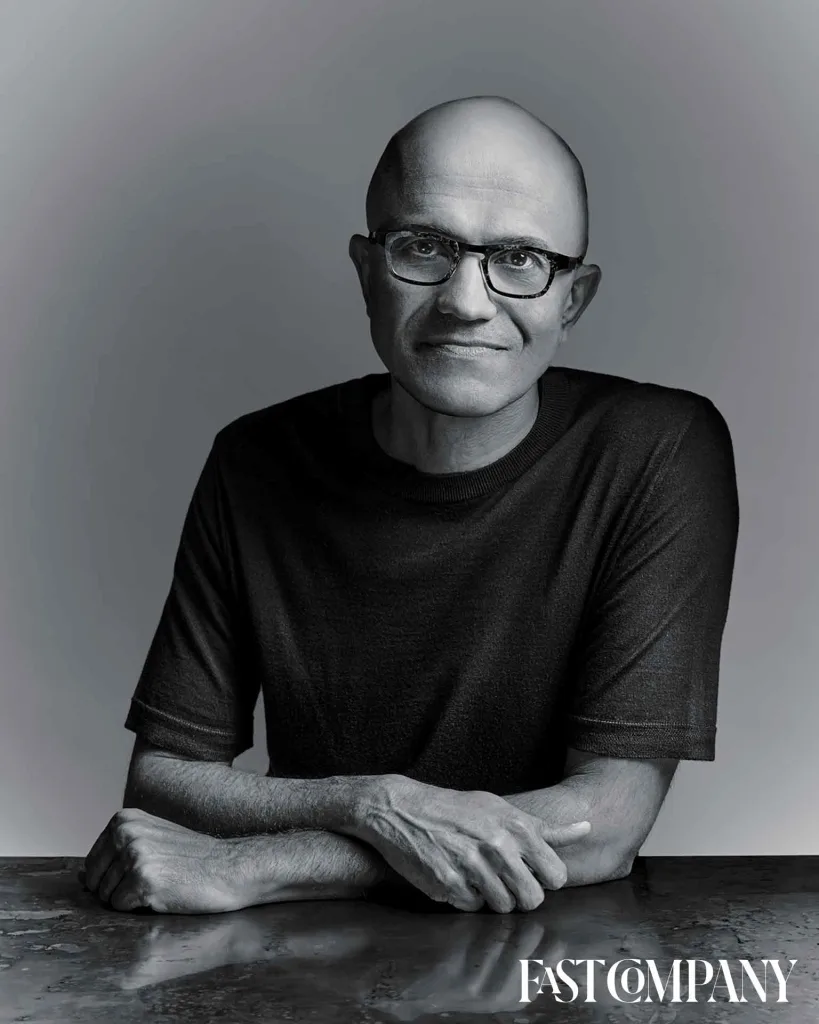This story is part of a special series celebrating the 10th anniversary of the Fast Company Innovation Festival.
Ask Microsoft CEO Satya Nadella about his approach to innovation, and he tends to reminisce. He’ll name-check Skype Translator, the real-time language-translation tool he unveiled soon after being tapped to run Microsoft in 2014—a crucial early sign of his commitment to AI leadership, as he sees it. Or he’ll turn way back to what it was like to join the company in 1992, as computer networks were just taking off—still one of the industry’s most epoch-shifting moments.
In other words, according to Nadella, what seem to be inflection points are usually the result of years of patient investment. “You can’t say, ‘Oh, ChatGPT just launched—it’s time to take [AI] seriously,’ ” he says. “That’s too late.” But his remarkable run at the software behemoth, which has seen its market cap go up more than tenfold in his time as CEO, reflects his ability to focus on new possibilities rather than past glories.
Instead of relying solely on Microsoft’s own long-standing AI research efforts, he made a prescient investment in OpenAI in 2019, getting first dibs on the same groundbreaking technology that powers ChatGPT. This year, he forged a deal with French AI startup Mistral AI, a rising competitor to OpenAI and Google known for its open-source AI. He also pulled off a hiring coup when Google DeepMind cofounder Mustafa Suleyman agreed to head a new Microsoft consumer AI group.
Along the way, Nadella has resisted the temptation to tamper with key Microsoft acquisitions such as LinkedIn and GitHub. Instead, he’s allowed them to bloom on their own terms, making them far more valuable than if he’d remolded them to be more obviously Microsoftian.

Nadella’s first decade as CEO has not been without some disappointments—the HoloLens augmented reality headset made a splash then didn’t go anywhere, and he has expressed regret that Microsoft exited the smartphone business in 2016. Still, Nadella’s leadership has been guided by his belief that computing will become only more ubiquitous and that Microsoft should spread its bets broadly, learning as it goes. Some initiatives “have worked better than I expected, and some are taking longer than I expected,” he says. “But I’m always coming back to those core principles.”
Login to add comment
Other posts in this group

Social media users have been having a field day with Waymo’s autonomou

If you’re not on TikTok, you may not have heard of Aaron Parnas. But for many young people across the U.S., he’s a prominent political news source, with over 3.5 million followers on TikTok and ju

Getting a sense of the scale of social media platforms can be tricky. While tech companies often share self-serving metrics—like monthly active users or how likely users are to buy products after


Fun fact: The saying “work smarter, not harder” is coming up on its 100th birthday. Coined

If you’ve followed Apple for any length of time, you’ve no doubt come across the notion that the company doesn’t rush into adopting cutting-

Every now and then, you run into a tool that truly wows you.
It’s rare—especially nowadays, when everyone and their cousin is coming out with overhyped AI-centric codswallop tha
